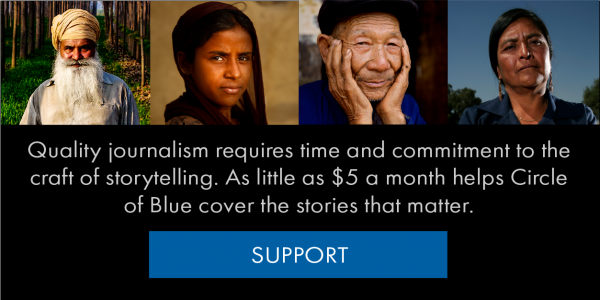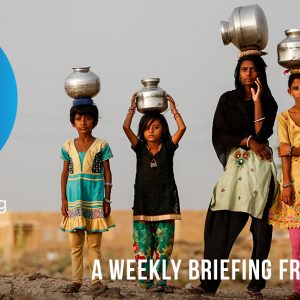The Stream, March 26: Diarrhea and Cholera Outbreaks Loom in Cyclone-Hit Mozambique
The Global Rundown
Mozambique braces for an outbreak of waterborne diseases following Cyclone Idai. In conflict zones, polluted water kills more children than direct violence, a UNICEF study finds. Sri Lanka begins nationwide power cuts as drought hampers hydropower output. Flash floods kill 17 people and injure dozens in southern Iran. Flooding disrupts water treatment plants Kansas City, Missouri.
“With all that runoff, we’re seeing river conditions like we haven’t seen in more than a decade.” –Brooke Givens, a spokeswoman for KC Water, in reference to water levels along the Missouri River. Flooding in the midwestern United States disrupted water treatment in the Kansas City area over the weekend. Testing by KC Water found high levels of turbidity in the water, raising the possibility of bacteria, viruses, or parasites being present. Reuters
In context: Historic Missouri River Flood Damages Water Infrastructure.
Latest WaterNews from Circle of Blue
HotSpots H2O: Water, Food Shortages Deadlier than Violence in Embattled Yemen — More hunger is on the horizon for those enduring Yemen’s protracted conflict, now entering a fifth year.
What’s Up With Water – The UN’s Latest World Water Development Report — This week’s edition of What’s Up With Water includes coverage on the UN‘s latest World Water Development report, New Mexico‘s bill for reusing fracking water, and the devastating impact across southern Africa brought on by Cyclone Idai.
By The Numbers
686 Latest death toll from Cyclone Idai, which hit Mozambique, Zimbabwe, and Malawi on March 14. The Mozambique government has warned that outbreaks of waterborne diseases, including cholera and diarrhea, are inevitable, and is setting up a cholera prevention and treatment center. Reuters
56,000 People affected by flooding in Iran over the past week. Deadly flash floods hit southern Iran on Monday, killing at least 17 people and injuring more than 70 others. U.S. News & World Report
Science, Studies, And Reports
A new report by UNICEF analyzed data from 16 countries embroiled in long-term conflict and found that children under age five are 20 times more likely to die from waterborne diseases than from direct violence. Children under 15 are three times more likely to die as a result of unsafe water and sanitation. The report notes an increase in targeting of civilian infrastructure such as water plants and hospitals. The Guardian
On The Radar
Sri Lanka is beginning four-hour daily power cuts as drought slashes hydropower output. Experts say the shortfall is due to the government’s failure to construct new power plants. Thomas Reuters Foundation

Kayla Ritter is a recent graduate of Michigan State University, where she studied International Relations and Teaching English to Speakers of Other Languages. She is currently based in Manton, Michigan. Kayla enjoys running, writing, and traveling. Contact Kayla Ritter






Leave a Reply
Want to join the discussion?Feel free to contribute!